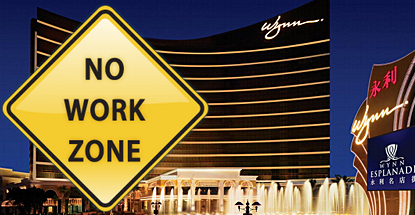 Macau’s casino industry gave off another strong signal that all is not well after Wynn Resorts asked its staff to take voluntary unpaid leave.
Macau’s casino industry gave off another strong signal that all is not well after Wynn Resorts asked its staff to take voluntary unpaid leave.
The Hong Kong Standard reported that Wynn Macau staff received text messages seeking volunteers to take “no-pay leave or annual leave from March 9-15.” While the request is for volunteers, it marks the first time Wynn Macau has made such a request since the 2008 global economic crisis. Other Macau casinos have reportedly been making similar requests of their staff since December due to the lack of customers at their gaming tables.
PROXY BETTING BACK IN VOGUE?
In a further sign that Macau casino operators are leaving no revenue stone unturned, some operators have reportedly restarted their telephone betting business. Last week, Daiwa Securities claimed “at least one” of the two operators that suspended telephone betting last year had quietly resumed the practice.
Sands China cut off its proxy betting in October and a spokesperson told GGRAsia that the company had not rethought its decision. Wynn Macau is believed to be the other operator who dropped the ban hammer but its current stance on the practice is unknown.
Phone betting or proxy betting involves a trusted go-between who sits at the gaming table and relays play-by-play card information to a mainland bettor, who decides how much to wager on any given hand. The practice, which allows high-rollers to gamble without having to leave the mainland, was believed to account for up to 8% of Macau’s VIP gaming turnover.
INDIVIDUAL VISIT SCHEME REJIG PROMISES TO CONSIDER CASINO INTERESTS
Meanwhile, Macau’s government says it expects to receive a report on the special administrative region’s tourist capacity within a week. Macau’s secretary for Social Affairs and Culture Tam Chon Weng raised eyebrows and casino operators’ pulse rates last month when he declared that Macau intended to reduce the number of mainland tourists it’s prepared to accept.
However, Tam subsequently clarified that the government’s intention was to “control” the number of tourists, not to “limit” them. Tam said the goal was to “optimize” the number of tourists using the Individual Visit Scheme, which limits mainland tourists to two annual trips to Macau.
Macau’s government plans to submit a new tourist plan to China’s central government sometime in April. Tam said the government would consider the impact on casino operators when crafting its plan. Tam also suggested any new measures could be implemented progressively and could be adjusted depending on their effect on Macau’s tourist-reliant businesses.
